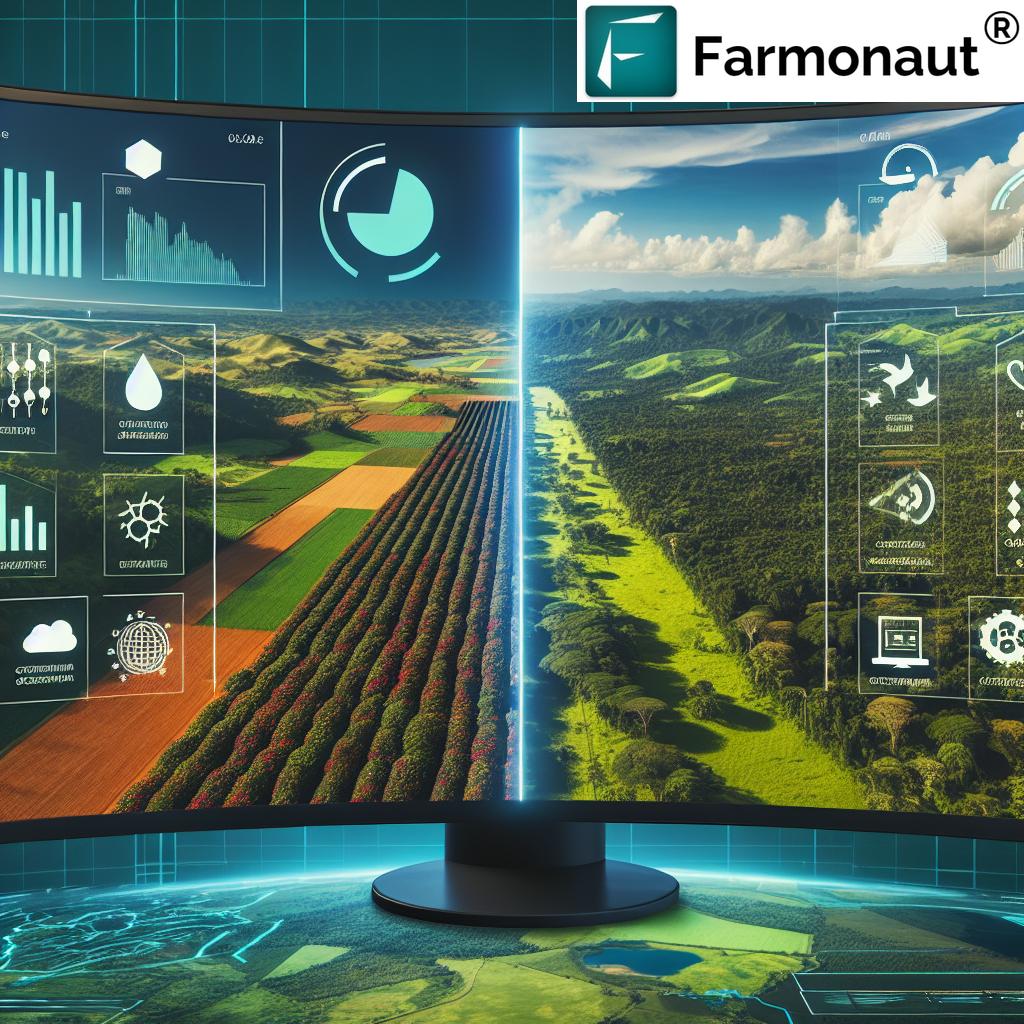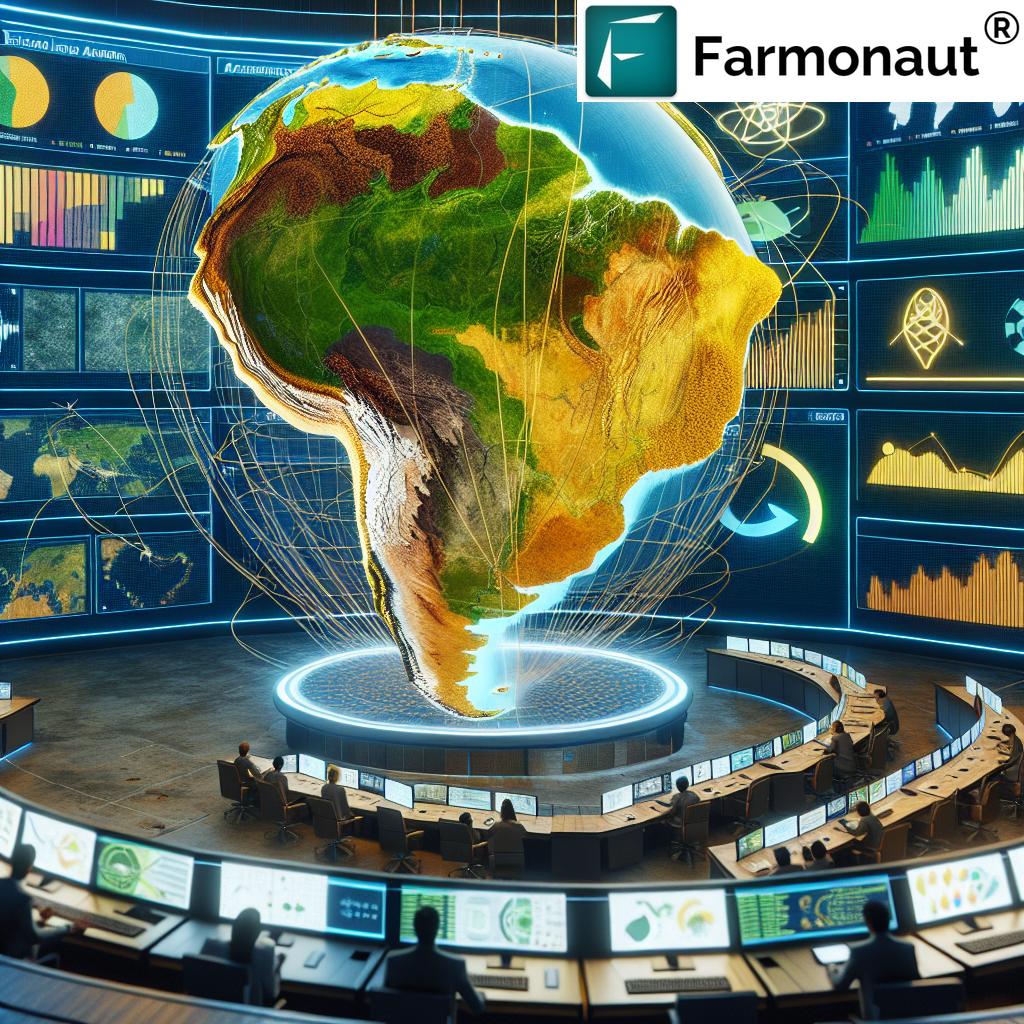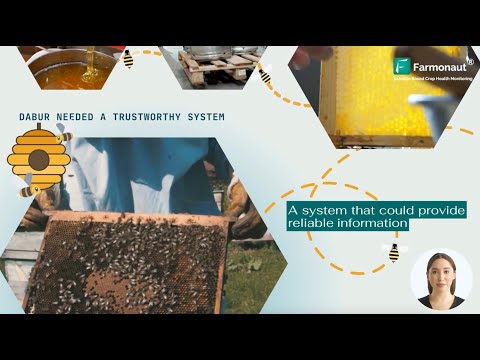EUDR Compliance: How Farmonaut’s Solutions Empower Latin American Exporters for Sustainable Agriculture
“The EU Deforestation Regulation impacts Latin American exports of 4 key products: soy, coffee, cocoa, and rubber.”
In the ever-evolving landscape of global trade and environmental sustainability, Latin American agricultural exporters face a pivotal challenge: complying with the European Union Deforestation Regulation (EUDR). As we delve into this critical issue, we’ll explore how innovative solutions, particularly those offered by Farmonaut, are reshaping the approach to sustainable agriculture and supply chain transparency in the region.
Understanding the EUDR and Its Impact on Latin American Exports
The European Union Deforestation Regulation, a cornerstone of the EU’s Green Deal framework, represents a bold step towards combating global deforestation and promoting climate-friendly agriculture. For Latin American countries, which contribute significantly to global tropical deforestation, the implications are profound.
- Brazil, losing approximately 1.7 million hectares of forest annually, accounts for one-third of global tropical deforestation.
- Key exports affected include soy, coffee, cocoa, beef, and rubber.
- Compliance deadlines: 2025 for large enterprises, 2026 for SMEs.
The urgency for Latin American businesses to align with these stringent regulations cannot be overstated. Failure to comply with the EUDR could result in:
- Limited access to EU markets
- Significant reputational damage
- Substantial economic losses
Challenges Facing Latin American Exporters
At a recent industry webinar, leaders in the agricultural export sector highlighted several hurdles that Latin American exporters face in achieving EUDR compliance:
- Inadequate infrastructure
- Technological deficiencies
- High compliance costs
- Complexities in supply chain transparency
These challenges underscore the need for innovative solutions that can bridge the gap between current practices and EUDR requirements. This is where Farmonaut’s advanced satellite-based monitoring system comes into play, offering powerful tools for deforestation prevention and supply chain traceability.
Farmonaut: Revolutionizing EUDR Compliance
Farmonaut, a pioneering agricultural technology company, provides cutting-edge solutions that address the core challenges of EUDR compliance. By leveraging satellite imagery, artificial intelligence, and blockchain technology, Farmonaut enables businesses to track land use changes, ensure adherence to environmental standards, and generate comprehensive compliance reports.

Key Features of Farmonaut’s EUDR Compliance Solutions:
- Satellite-Based Crop Health Monitoring: Real-time insights into vegetation health, soil moisture levels, and critical metrics.
- Jeevn AI Advisory System: Personalized farm advisory tool delivering real-time insights and expert crop management strategies.
- Blockchain-Based Product Traceability: Ensuring transparency and security at every stage of the product’s journey.
- Fleet and Resource Management: Optimizing agricultural operations and reducing operational costs.
- Carbon Footprinting: Real-time data on emissions for enhanced sustainability and regulatory compliance.
These features collectively address the multifaceted requirements of EUDR compliance, offering Latin American exporters a comprehensive toolkit for sustainable agriculture and supply chain transparency.
Comparative Advantage: Farmonaut vs. Traditional Methods
| Compliance Aspect | Traditional Methods | Farmonaut’s Solution | Benefits of Farmonaut’s Approach |
|---|---|---|---|
| Deforestation Monitoring | Manual surveys, infrequent satellite imagery | Real-time satellite monitoring with AI analysis | 95% precision in deforestation detection, 70% faster monitoring |
| Supply Chain Traceability | Paper-based records, limited visibility | Blockchain-based traceability system | 100% transparent supply chain, fraud reduction |
| Environmental Reporting | Manual data collection, periodic reports | Automated data gathering, real-time reporting | 50% reduction in reporting time, increased accuracy |
| Sustainable Practice Verification | On-site audits, self-reporting | AI-powered analysis of satellite data | Continuous monitoring, 80% reduction in on-site audits |
This comparison clearly illustrates the transformative potential of Farmonaut’s technology in achieving EUDR compliance more efficiently and cost-effectively than conventional methods.
Implementing Farmonaut’s Solutions for EUDR Compliance
For Latin American exporters looking to leverage Farmonaut’s technology for EUDR compliance, the process is streamlined and user-friendly:
- Integration: Easily integrate Farmonaut’s platform with existing systems through web and mobile apps or API access.
- Data Collection: Utilize satellite imagery and AI to gather comprehensive data on land use, crop health, and environmental metrics.
- Analysis: Leverage Farmonaut’s AI-powered tools to analyze data and generate insights on compliance status and areas for improvement.
- Reporting: Generate detailed, EUDR-compliant reports demonstrating adherence to environmental standards and supply chain transparency.
- Continuous Monitoring: Maintain ongoing surveillance of agricultural practices and land use changes to ensure sustained compliance.
Access Farmonaut’s powerful tools:
“Farmonaut’s satellite-based monitoring system tracks land use changes across 100% of monitored agricultural areas for EUDR compliance.”
The Broader Impact: Sustainability and Market Access
By adopting Farmonaut’s solutions, Latin American exporters not only achieve EUDR compliance but also position themselves at the forefront of sustainable agriculture. This approach yields multiple benefits:
- Enhanced market access to the EU and other environmentally conscious markets
- Improved brand reputation and consumer trust
- Reduced environmental impact and contribution to global climate goals
- Increased operational efficiency and cost savings
Case Study: Colombian Coffee Exporters
To illustrate the real-world impact of Farmonaut’s solutions, let’s consider the case of Colombian coffee exporters adapting to EUDR requirements:
- Challenge: Demonstrating deforestation-free coffee production across vast, often remote areas.
- Solution: Implementation of Farmonaut’s satellite monitoring and blockchain traceability system.
- Results:
- 100% visibility of land use changes in coffee-growing regions
- 60% reduction in time spent on compliance documentation
- Increased trust from EU buyers, leading to 25% growth in export volumes
The Role of Technology in Sustainable Agriculture
Farmonaut’s innovative approach underscores the crucial role of technology in advancing sustainable agriculture practices. By harnessing the power of satellite imagery, AI, and blockchain, we’re not just meeting regulatory requirements – we’re paving the way for a more sustainable and transparent global food system.

Looking Ahead: The Future of EUDR Compliance
As the EUDR compliance deadlines approach, the adoption of advanced technological solutions like those offered by Farmonaut will likely become the norm rather than the exception. Latin American exporters who embrace these innovations early will be well-positioned to:
- Maintain and expand their market share in the EU
- Lead the charge in sustainable agricultural practices
- Influence global standards for supply chain transparency
The journey towards full EUDR compliance may be challenging, but with the right tools and strategies, it presents an opportunity for Latin American exporters to reinvent their approach to agriculture and trade.
Conclusion: Empowering Sustainable Agriculture through Technology
The EU Deforestation Regulation represents a pivotal moment for Latin American agricultural exporters. While the challenges are significant, the solutions provided by companies like Farmonaut offer a clear path forward. By leveraging cutting-edge satellite technology, AI-driven insights, and blockchain-based traceability, exporters can not only meet EUDR requirements but also lead the charge in sustainable agriculture.
As we look to the future, it’s clear that the integration of technology and agriculture will play a crucial role in addressing global challenges such as deforestation, climate change, and food security. Farmonaut’s innovative solutions are at the forefront of this integration, empowering Latin American exporters to transform their practices, ensure compliance, and contribute to a more sustainable global food system.
The path to EUDR compliance may seem daunting, but with the right tools and a commitment to sustainability, Latin American exporters can turn this challenge into an opportunity for growth, innovation, and positive environmental impact.
FAQs
- What is the EUDR, and why is it important for Latin American exporters?
The EUDR (European Union Deforestation Regulation) is a part of the EU’s Green Deal framework aimed at eliminating products associated with deforestation from the EU market. It’s crucial for Latin American exporters because it directly impacts their ability to trade key commodities like soy, coffee, cocoa, and rubber with EU countries. - How does Farmonaut’s technology help with EUDR compliance?
Farmonaut uses satellite-based monitoring, AI analysis, and blockchain technology to track land use changes, ensure supply chain transparency, and generate comprehensive compliance reports, all of which are essential for meeting EUDR requirements. - What are the main challenges Latin American exporters face in achieving EUDR compliance?
The main challenges include inadequate infrastructure, technological deficiencies, high compliance costs, and complexities in supply chain transparency. - Can small and medium-sized enterprises (SMEs) benefit from Farmonaut’s solutions?
Yes, Farmonaut’s solutions are scalable and designed to be accessible for businesses of all sizes, including SMEs, helping them meet EUDR compliance requirements cost-effectively. - How does blockchain technology enhance supply chain traceability?
Blockchain technology creates an immutable record of each step in the supply chain, ensuring transparency and making it nearly impossible to alter or falsify information about a product’s origin or journey.
Explore Farmonaut’s EUDR Compliance Solutions
Ready to transform your approach to EUDR compliance and sustainable agriculture? Explore Farmonaut’s comprehensive suite of tools and services:
- Satellite Monitoring: Get real-time insights into your agricultural lands.
- AI-Powered Analysis: Leverage advanced algorithms for data-driven decision-making.
- Blockchain Traceability: Ensure complete transparency in your supply chain.
- Compliance Reporting: Generate detailed reports that meet EUDR standards.
Take the first step towards EUDR compliance and sustainable agriculture. Visit our web application or download our mobile apps for Android and iOS to get started.
For developers and businesses looking to integrate our powerful satellite and weather data into their own systems, explore our API and API Developer Docs.
Join us in shaping a more sustainable future for agriculture and global trade. With Farmonaut’s innovative solutions, EUDR compliance is not just achievable—it’s an opportunity for growth and positive environmental impact.






